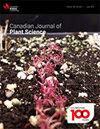安排适当的灌溉减轻了在半干旱生态区生长的Ambrosia™苹果的采后软烫伤症
IF 1
4区 农林科学
Q3 AGRONOMY
引用次数: 1
摘要
摘要研究了灌溉对Ambrosia™苹果软烫病(SS)的影响,研究了灌溉对Ambrosia™苹果软烫病的影响。通过在三个商业果园的一系列试验中操纵灌溉方案,进一步验证了这些观察结果。充足灌溉(AI)被定义为维持省级灌溉指南中定义的可持续生产所需的水量,而缺灌(DI)将同一地点的灌溉减少到低于AI的40%。调查研究记录显示,SS发病率与浇水量呈负相关(r = - 0.9)。验证性研究证实了在三个不同的商业地点的相关性。这些结果表明,在干旱气候地区生长的Ambrosia™苹果,在果实膨大期和后期充足的水分可以减轻SS的影响。他们还认为,在仲夏之前进行DI并不会不可逆转地导致该苹果的SS敏感性。本文章由计算机程序翻译,如有差异,请以英文原文为准。
Scheduling adequate irrigation mitigates postharvest soft scald disorder of Ambrosia™ apples grown in a semiarid eco-zone
Abstract The effect of irrigation on soft scald (SS) disorder in Ambrosia™ apples was surveyed over 4 years in various orchards in Cawston, BC which is located in a valley having a semiarid eco-zone. The observations were further validated by manipulating irrigation programs in a series of experiments in three commercial orchards. Adequate irrigation (AI) was defined as the amount of water application required to maintain sustainable production as defined in the provincial irrigation guide, while deficit irrigation (DI) reduced irrigation to less than 40% of AI at the same site. Records from the survey study indicated that SS incidence was negatively correlated with the amount of watering (r = −0.9). The validation study confirmed that correlation at three different commercial sites. These results suggest that intensive water deficit can cause fruit to be susceptible to SS and that adequate watering during fruit expansion and late season exerts a mitigating effect on SS in Ambrosia™ apples grown in a dry climate region. They also suggest that conducting DI prior to midsummer does not irrevocably cause SS susceptibility in this apple.
求助全文
通过发布文献求助,成功后即可免费获取论文全文。
去求助
来源期刊
CiteScore
1.90
自引率
8.30%
发文量
91
审稿时长
1 months
期刊介绍:
Published since 1957, the Canadian Journal of Plant Science is a bimonthly journal that contains new research on all aspects of plant science relevant to continental climate agriculture, including plant production and management (grain, forage, industrial, and alternative crops), horticulture (fruit, vegetable, ornamental, greenhouse, and alternative crops), and pest management (entomology, plant pathology, and weed science). Cross-disciplinary research in the application of technology, plant breeding, genetics, physiology, biotechnology, microbiology, soil management, economics, meteorology, post-harvest biology, and plant production systems is also published. Research that makes a significant contribution to the advancement of knowledge of crop, horticulture, and weed sciences (e.g., drought or stress resistance), but not directly applicable to the environmental regions of Canadian agriculture, may also be considered. The Journal also publishes reviews, letters to the editor, the abstracts of technical papers presented at the meetings of the sponsoring societies, and occasionally conference proceedings.

 求助内容:
求助内容: 应助结果提醒方式:
应助结果提醒方式:


